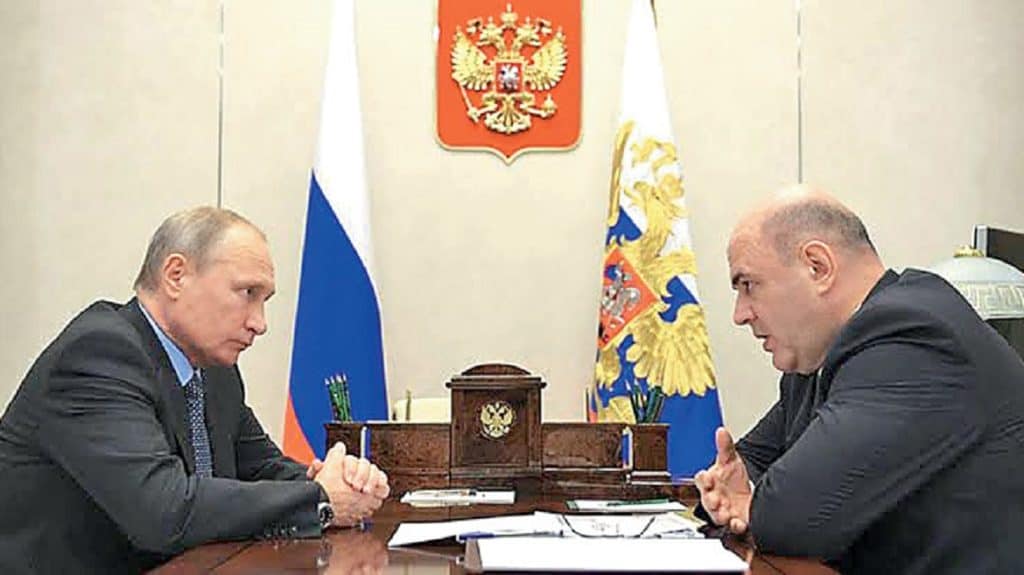The resignation of the Russian government, led by Dmitry Medvedev, and the subsequent constitutional reform in Russia, surprised the international actors, that did not understood what really happened in Moscow and what caused the need for radical changes in the Russian state.
Meanwhile, there are not doubts on the the fact that Russian President Vladimir Putin intends to mitigate tensions existing in relation to the Kremlin actions, both at domestic level and in the international arena, through resolute decisions. However, these changes are taking place in backdrop of the upcoming election campaigns in Russia – the lower house of the Russian parliament and the Head of State elections. Based on this, according to a number of analysts, the ongoing changes reflect the desire of the Russian political elite to ensure the implementation of the succession project.
Especially for World Geostrategic Insights, Denis Korkodinov talked about this with the Russian political technologist Dmitry Loginov.

1. The emergency formation at the initiative of the President of Russia of a new government, in the literal sense of the word, shocked many political experts and the international community as a whole. No one expected this turn of events, as a result of which a variety of explanations appeared regarding this, among which the theory of conspiracy within the Russian political elite became the most challenging. In addition, the constitutional reform announced by Vladimir Putin was yet another occasion for various rumors and gossip. Why was it necessary to form a new government in Russia and begin constitutional reform? On what principles is the activity of the new government of Russia built? Will the activities of the new government and constitutional reform lead to an improvement in the external and internal political and economic climate in Russia?
DMITRY LOGINOV: There are several obvious reasons for the formation of a new cabinet in Russia. First of all, the quality of the work of the previous cabinet of ministers was regularly criticized both by the professional expert community and by the residents of the country. Extreme lack of coordination of work and numerous failures led to a radical replacement of 50% of the entire government, and the introduction of new candidates, including the appointment of a new chairman of the government: Mikhail Mishustin – a clear professional in the field of public administration.
The activities of the new government will be aimed at accelerating the implementation of national projects necessary to improve the welfare of the Russian population.
Russian President Vladimir Putin needed an effective and universal tool for the execution of his instructions. In addition, in the context of the regular changes in the international political and economic situation, as well as the prospects for the deterioration of the external situation, specialists were required who could immediately and competently respond and maintain a stable situation in the country.
Constitutional reform, first of all, is aimed at consolidating the foundations of the welfare state in the Constitution. Accordingly, amendments to federal and regional laws will follow that will not allow inadequate response to logical and legal requirements and requests of the population.
According to leading political scientists of Russia, the announced constitutional reform is designed to eliminate existing social contradictions and ease tension. At least, the new provisions of the Basic Law reflect the opinion of most expert groups formed from representatives of various professions and qualifications.
2. At present, the process of amending the Basic Law of the Russian Federation is causing a lot of controversy. Representatives of the non-systemic political opposition proceed from the opinion that the new content of the Constitution of Russia will not entail any fundamental changes in the lives of ordinary citizens. However, supporters of the constitutional reform argue that the new Russian Constitution will contain binding mechanisms to improve the socio-economic basis of the state. What opinion reflects the actual state of affairs? Why? Was there a need to amend the country’s Basic Law or was it enough to tighten control over the implementation of federal legislation?
DMITRY LOGINOV: Changes in the Russian Constitution should be accompanied by tightening compliance with its points. And this is currently being decided only on the basis of supreme political will. Those who are not able to fulfill this will locally will not be able to work in this new coordinate system.
The new Constitution should bring a balance between foreign and domestic policy, reduce the pace of growing social tension within Russian society.
Previous constitutional provisions worked exclusively in the “manual mode”, when the country’s president had to personally intervene in the process of making certain decisions at the local level and force regional officials to act in accordance with social needs, federal laws and the country’s Constitution. This significantly impeded the development of the state system, in which it was necessary to constantly use the personal participation and authority of Vladimir Putin, without which local authorities did not want or could not effectively fulfill their duties.
This state of affairs could not exist for a long time, since it caused growing discontent among ordinary citizens who had ceased to trust regional officials due to the fact that they had virtually ceased to work in the existing legal system. It was necessary to develop a new Basic Law, which would increase responsibility at all levels of government and contribute to a “reset” of relations between the people and officials.
Representatives of the non-systemic political opposition are trying to use constitutional reform as an occasion for dissatisfaction. However, it makes no sense to listen to the pseudo-liberal opposition on the quality of implementation of the new Constitution. This opposition will not calm down anyway, as long as the existing state system exists.
3. On the eve of the election of deputies of the State Duma of Russia, which will be held in 2021, the struggle for the electorate began to be actively felt in the country. So, in 2019 alone, 39 new political parties were registered in Russia. In addition, the number of publications on the domestic political development of Russia, which is one of the signs of influence on voters’ preferences, has noticeably increased in the federal and international press. What are the forecasts regarding the upcoming elections of deputies of the lower house of the Russian parliament? What positions can the United Russia political party take in the new composition of the State Duma?
DMITRY LOGINOV: It should be noted that the election of deputies of the State Duma of Russia will constitute serious competition for a sufficiently large number of mandates. A new generation of political leaders has grown in Russia who are ready to prove themselves, have enough experience, competencies and financial resources. In addition, this is one of the chances for various groups of influence to bring their people to parliament to further influence the transition period before the new presidential election.
The political party “United Russia” will try to keep the majority in the new parliament. But politics has become a deeper topic, and political affiliation will play a secondary role. For this reason, the participation of certain candidates in the “party in power” will not guarantee their success in the elections, as voters will evaluate, first of all, what the future parliamentarian has already done or can do for ordinary citizens and for the state as a whole . In other words, the decisive factor in the manifestation of electoral preferences will be the principle of practical benefit from a particular deputy.
A feature of this campaign will be an attempt by the opposition to draw a card of criticism of “United Russia” about the pension reform. In part, this position will receive a response from the population, but the key to success can be the proposal by the political forces of a new agenda that is radically different from all the previous ones, putting at the forefront not only the welfare of society, but also the national idea, which is now absent. At the local level, candidates will be able to successfully use any initiatives to involve society in the processes of increasing their own well-being.







